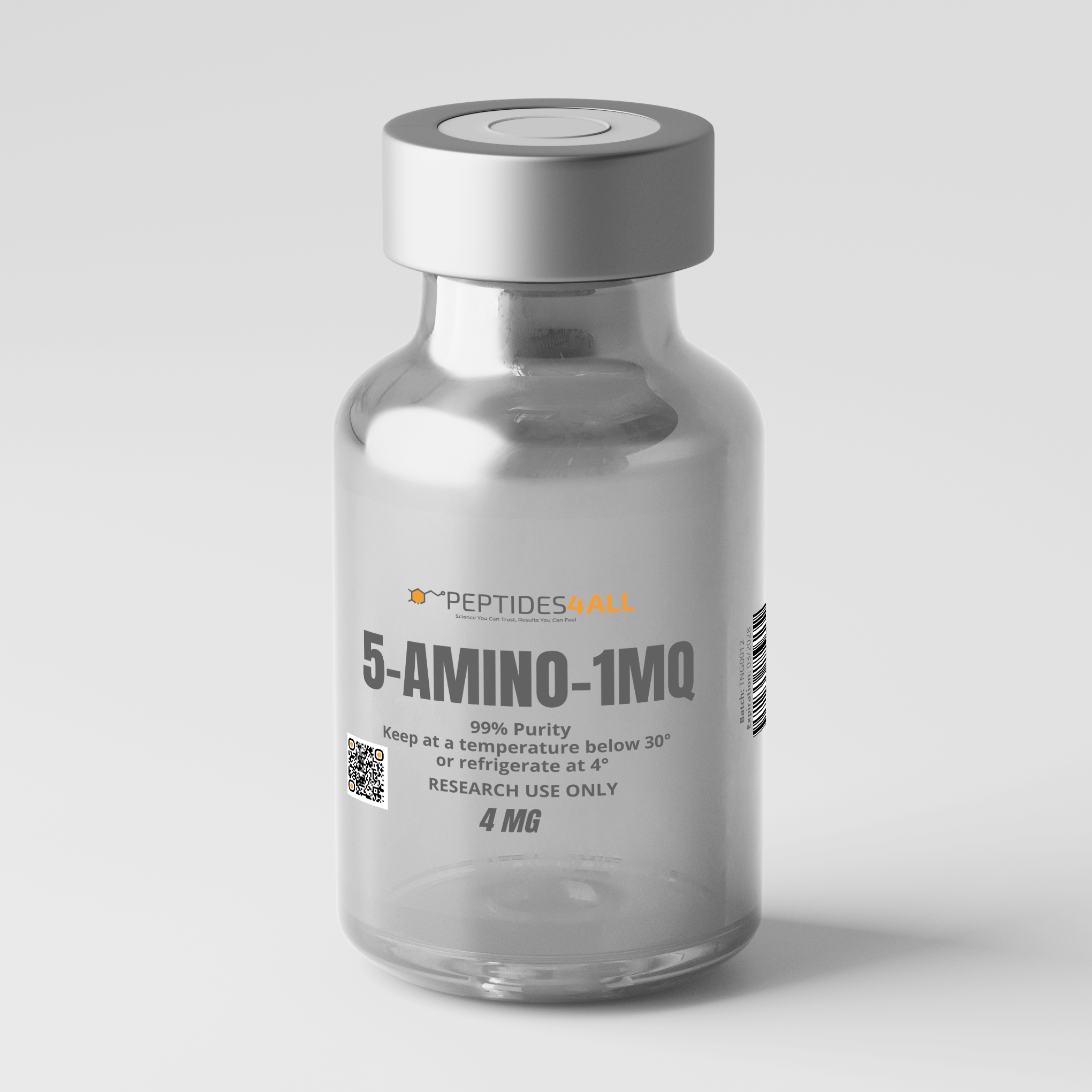PEPTIDES4ALL 5-Amino-1MQ – NNMT Inhibitor for Metabolic & NAD⁺ Research
PEPTIDES4ALL 5-Amino-1MQ (5-amino-1-methylquinolinium) is a potent small-molecule inhibitor of nicotinamide N-methyltransferase (NNMT)—a metabolic enzyme that plays a pivotal role in regulating NAD⁺ homeostasis, energy expenditure, and fat metabolism. NNMT catalyzes the methylation of nicotinamide (vitamin B3), diverting it away from the NAD⁺ salvage pathway and generating 1-methylnicotinamide (1-MNA) as a byproduct. When NNMT activity is elevated—as observed in obesity, insulin resistance, and aging—cellular NAD⁺ levels decline, impairing mitochondrial efficiency and metabolic flexibility.
By selectively inhibiting NNMT, 5-Amino-1MQ restores nicotinamide availability, supporting enhanced NAD⁺ biosynthesis, improved energy metabolism, and reduced adiposity. Research shows that NNMT inhibition triggers increased intracellular NAD⁺ concentrations, enhances sirtuin (SIRT1) activity, and improves oxidative metabolism, thereby promoting a healthier metabolic phenotype (Frontiers in Pharmacology, 2024).
Preclinical models demonstrate that 5-Amino-1MQ reverses diet-induced obesity, reduces white adipose tissue mass and adipocyte size, and improves insulin sensitivity and glucose regulation without altering food intake (PMC8337113). These findings highlight its potential utility in exploring metabolic disorders, weight management, and age-related mitochondrial decline.
Further studies have revealed that NNMT inhibition by 5-Amino-1MQ enhances physical performance and muscular endurance in aged animals, suggesting a direct link between NAD⁺ restoration and improved cellular energy utilization (NMN News, 2024). Importantly, 5-Amino-1MQ displays high specificity and membrane permeability, showing little to no interference with related methyltransferases or NAD⁺-related enzymes such as SIRT1 or NAMPT, supporting its use as a precise biochemical tool for NAD⁺ and energy metabolism research.
With its high-purity lyophilized formulation and well-characterized mechanism, PEPTIDES4ALL 5-Amino-1MQ enables researchers to study NNMT’s role in metabolic regulation, NAD⁺ salvage pathway dynamics, and cellular energy homeostasis, offering a window into the development of next-generation metabolic and longevity therapeutics.
Scientific Evidence & Research Findings
-
Reduces NNMT activity & lowers methylated nicotinamide product (1-MNA) – In adipocyte models, 5-Amino-1MQ reduced intracellular levels of 1-MNA, a methylated nicotinamide derivative, indicating effective inhibition of NNMT. https://pmc.ncbi.nlm.nih.gov/articles/PMC5826726/
-
Boosts intracellular NAD⁺ levels – By blocking the diversion of nicotinamide to 1-MNA, 5-Amino-1MQ increases the amount of nicotinamide available for NAD⁺ salvage, improving cellular NAD⁺ pools. https://www.frontiersin.org/articles/10.3389/fphar.2024.1410479/full
-
Reverses diet-induced obesity & reduces fat mass – In mouse models fed high-fat diets, treatment with 5-Amino-1MQ significantly reduced body weight, white adipose tissue mass, and adipocyte size, without affecting food intake. https://pmc.ncbi.nlm.nih.gov/articles/PMC8337113/
-
Improves insulin sensitivity & metabolic parameters – Data suggests that NNMT inhibition by 5-Amino-1MQ helps improve glucose handling and insulin sensitivity in obesity models. https://pmc.ncbi.nlm.nih.gov/articles/PMC8337113/
-
Enhances strength and endurance in aged mice – Recent work shows that 5-Amino-1MQ improved grip strength and physical capacity in older mice, surpassing exercise benefits in some metrics. https://www.nmn.com/news/new-insights-on-muscle-strength-the-role-of-inhibiting-an-enzyme-that-hinders-nad-synthesis
-
High specificity & membrane permeability – 5-Amino-1MQ appears selective for NNMT and does not significantly inhibit related methyltransferases or NAD⁺ salvage enzymes (e.g. SIRT1, NAMPT) at comparable concentrations, supporting its safety profile in research settings. https://pmc.ncbi.nlm.nih.gov/articles/PMC8337113/
Key Research Benefits & Applications
-
Restores NAD⁺ Homeostasis: Inhibits NNMT activity to preserve nicotinamide availability, increase NAD⁺ synthesis, and enhance sirtuin (SIRT1) signaling for improved cellular energy metabolism.
-
Enhances Mitochondrial Efficiency: Boosts oxidative metabolism and improves ATP production by restoring NAD⁺-dependent enzymatic reactions critical to mitochondrial respiration.
-
Reduces Adiposity & Improves Metabolic Health: Demonstrates fat mass reduction, smaller adipocyte size, and improved insulin sensitivity in diet-induced obesity models without affecting food intake.
-
Supports Healthy Aging & Performance: Promotes muscular endurance, physical strength, and metabolic resilience in aging studies through NAD⁺ restoration and enhanced energy utilization.
-
Precision NNMT Inhibition: Selectively targets NNMT with minimal off-target effects, ensuring accurate evaluation of NAD⁺ salvage pathway dynamics and methyltransferase regulation.
-
Applications in Metabolic & Longevity Research: Serves as a powerful model compound for studying obesity, insulin resistance, mitochondrial decline, and age-related energy dysfunction.
Presentation & Handling
- Form: Supplied as lyophilized peptide in sterile vial.
- Reconstitution: Use bacteriostatic water or 2% procaine; swirl gently (do not shake vigorously).
- Storage: Store at –20 °C, protected from light and moisture. After reconstitution, use according to research protocols and handle under sterile conditions.
Intended Use
For research purposes only. Must be handled in accordance with institutional protocols and ethical guidelines.
